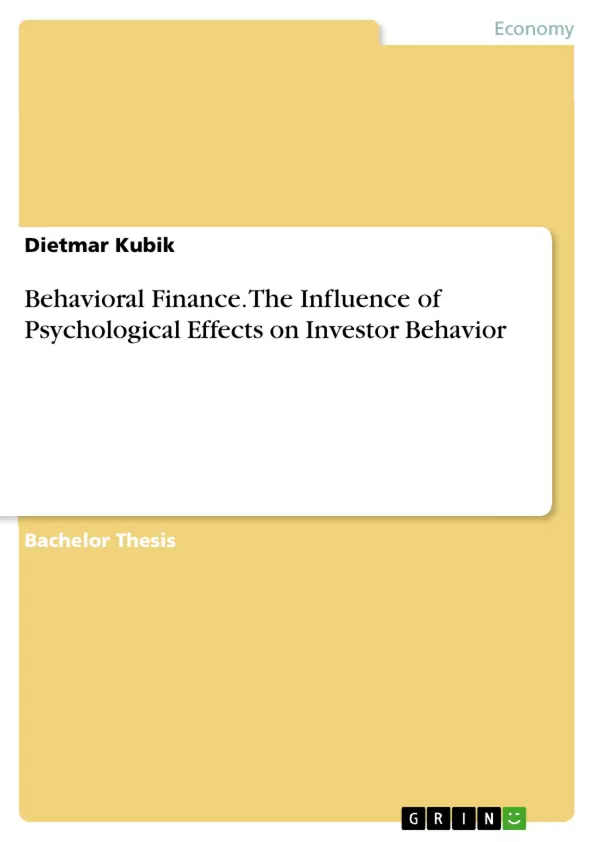
Behavioral Finance. The Influence of Psychological Effects on Investor Behavior
Bachelorarbeit, 2012
37 Seiten, Note: 1,0
Leseprobe
Inhaltsverzeichnis (Table of Contents)
- Introduction
- Problem definition and question
- Structure of the paper
- Traditional capital market theory
- Market efficiency hypothesis
- The model of "homo oeconomicus"
- Behavioral Finance
- Anomalies of human behavior
- Information perception anomalies
- Information processing anomalies
- Decision anomalies
- Findings from brain research
- Influence of moods
- Influence of stress
- Attitude and expectations
- Motivation
- Anomalies of human behavior
- Psychological effects in stock exchange trading
- Anomalies in decision-making behaviour
- Theory of cognitive dissonance
- The status quo bias
- Avoiding disappointment (regret aversion)
- Illusion of control
- Learned carelessness and learned helplessness
- Perception of profit and loss
- Prospect theory
- Investor risk behaviour
- Weighting of probabilities
- Risk management
- Illusionary Correlations
- Risk return paradox
- Reflection and framing effects
- Overreactions
- Excessive self-confidence (over confidence)
- Herd behavior (Herding)
- Fear and greed
- Anomalies in decision-making behaviour
- Summary and outlook
Zielsetzung und Themenschwerpunkte (Objectives and Key Themes)
This paper examines how psychological effects influence investor behavior in the financial market. It aims to show that traditional capital market theory, which assumes rationality, fails to fully explain market dynamics. The paper explores the "Behavioral Finance" theory, which incorporates psychological findings to analyze investor behavior and its impact on market trends, especially during boom and crash phases. The research aims to provide insights into how investor behavior can be optimized.
- Anomalies in human behavior and their implications for financial decision-making.
- The role of psychological effects in stock exchange trading.
- The influence of cognitive biases and heuristics on investor behavior.
- The impact of emotional factors like mood, stress, and motivation on investor decisions.
- The potential application of "Behavioral Finance" theory to optimize investor behavior and market outcomes.
Zusammenfassung der Kapitel (Chapter Summaries)
The paper begins by introducing the concept of "Behavioral Finance" and outlining its main objectives. It contrasts the traditional capital market theory, which assumes rational investor behavior, with the "Behavioral Finance" approach, which acknowledges the influence of psychological factors on financial decisions.
The paper then delves into the specific anomalies of human behavior that can impact investor behavior. These anomalies include information perception biases, information processing errors, and decision-making fallacies. The paper also explores how findings from brain research, along with the influence of mood, stress, attitudes, expectations, and motivation, can affect investors' actions.
The paper concludes by examining significant psychological effects in stock exchange trading, such as the theory of cognitive dissonance, the status quo bias, regret aversion, the illusion of control, and learned helplessness. It further explores how these effects influence the perception of profit and loss, investor risk behavior, and overreactions in the market.
Schlüsselwörter (Keywords)
The primary focus of this paper lies on the influence of psychological effects on investor behavior in the financial market. The key concepts explored include "Behavioral Finance", anomalies of human behavior, cognitive biases, psychological effects, stock exchange trading, investor behavior, boom, crash, profit, and loss.
Frequently Asked Questions
What is Behavioral Finance?
It is a field of study that examines how psychological influences and cognitive biases affect the financial decisions of investors and market outcomes.
How does it differ from traditional capital market theory?
Traditional theory assumes investors are rational "homo oeconomicus", while Behavioral Finance acknowledges that human behavior is often irrational and prone to errors.
What is "Herding" in stock exchange trading?
Herding refers to the tendency of investors to follow the actions of a larger group, often leading to market bubbles or crashes due to collective overreaction.
What is the "Illusion of Control"?
It is a psychological effect where investors overestimate their ability to influence or predict market events that are actually determined by chance.
How do stress and mood affect investment decisions?
High stress and certain moods can distort information processing, leading to impulsive decisions or excessive risk-taking during boom phases.
Details
- Titel
- Behavioral Finance. The Influence of Psychological Effects on Investor Behavior
- Hochschule
- Ferdinand Porsche FernFH
- Note
- 1,0
- Autor
- Dietmar Kubik (Autor:in)
- Erscheinungsjahr
- 2012
- Seiten
- 37
- Katalognummer
- V1169773
- Sprache
- Englisch
- Schlagworte
- behavioral finance influence psychological effects investor behavior
- Produktsicherheit
- GRIN Publishing GmbH
- Preis (Ebook)
- US$ 17,99
- Arbeit zitieren
- Dietmar Kubik (Autor:in), 2012, Behavioral Finance. The Influence of Psychological Effects on Investor Behavior, München, Page::Imprint:: GRINVerlagOHG, https://www.diplomarbeiten24.de/document/1169773
- Autor werden
- Ihre Optionen
- Vertriebskanäle
- Premium Services
- Autorenprofil
- Textarten und Formate
- Services für Verlage, Hochschulen, Unternehmen

- © GRIN Publishing GmbH.
- Alle Inhalte urheberrechtlich geschützt. Kopieren und verbreiten untersagt.
- info@grin.com
- AGB
- Open Publishing
Der GRIN Verlag hat sich seit 1998 auf die Veröffentlichung akademischer eBooks und Bücher spezialisiert. Der GRIN Verlag steht damit als erstes Unternehmen für User Generated Quality Content. Die Verlagsseiten GRIN.com, Hausarbeiten.de und Diplomarbeiten24 bieten für Hochschullehrer, Absolventen und Studenten die ideale Plattform, wissenschaftliche Texte wie Hausarbeiten, Referate, Bachelorarbeiten, Masterarbeiten, Diplomarbeiten, Dissertationen und wissenschaftliche Aufsätze einem breiten Publikum zu präsentieren.
Kostenfreie Veröffentlichung: Hausarbeit, Bachelorarbeit, Diplomarbeit, Dissertation, Masterarbeit, Interpretation oder Referat jetzt veröffentlichen!
- GRIN Verlag GmbH
-
- Nymphenburger Str. 86
- 80636
- Munich, Deutschland
- +49 89-550559-0
- +49 89-550559-10
- info@grin.com
-









